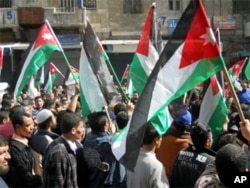Before the Middle East exploded in a fury of dissent, activists in Jordan were on the streets, campaigning for change. In Amman, protesters' demands sounded relatively noncontroversial compared to uprisings in other Arab countries. But locals and leaders know that democratic reform in Jordan will give the people more than just a representative government. Many say change in Jordan could upset the region’s delicate security balance and redefine the identity of the nation.
Every Friday afternoon for two months, Jordanians have gathered with signs, flags and loudspeakers, to let their demands be known. Journalists follow along, photographing the parade and listening while activists proclaim their anger at the government and, at the same time, their loyalty to their king.
At first, the protesters demanded economic justice. Low wages, soaring prices and high taxes were among the chief complaints. King Abdullah responded, dissolving his Cabinet and firing his prime minister. He said he agreed with the protesters and promised reforms.
University of Jordan Political Science Professor Hassan Barari says the protests will continue until reforms are enacted or the people get tired of waiting. He says if it takes too much time demands will become more urgent and more radical, and he says government authorities are not moving fast enough.
"They are buying time,” Barari said. “They want to talk about reforms without making reforms. They are hoping this dust, this tsunami of change in the Middle East, will come to an end soon and then after that business as usual."
Like most Jordanian’s, Barari is careful not to blame the monarch. King Abdullah, who is considered savvy and progressive, is wildly popular in Jordan. And, although political dissent is mostly tolerated, it is illegal to criticize the king.
Political dissent in Jordan is now poised to change more than just the lives of the protesters. The Islamic Action Front, the political wing of the Muslim Brotherhood, is the country’s only established opposition party. In a democratic election, polls suggest the IAF would take 20 to 25 percent of the seats in parliament. Analysts say it may be more.
Domestically, much of the IAF agenda is not that different from other emerging opposition groups. The party says it wants to end government corruption and fraud and hold elections that represent the people. It says it supports development and poverty reduction.
But IAF foreign policy is a different story. Analysts say the organization has no practical reason to want to dissolve the tenuous peace agreement between Jordan and Israel. But IAF Deputy Secretary-General Nimer al-Assaf says, if it was up to him, the peace treaty would be thrown out.
"We in Jordan do not to agree to the peace treaty with Israel, simply because we do not feel that it is just,” said al-Assaf. “And, also we do not feel that Jordan has gained anything from it."
Al-Assaf says Jordan’s sovereignty is threatened by Israeli designs to turn Jordan into a Palestinian state. But he says his party wants to let the people vote on the treaty before it is abandoned.
Jordanian analysts say the fear that IAF leadership in Jordan could erode regional security is overblown. Political science professor Mohammad al-Momani says the party is neither prepared to take on Israel and the international status quo, nor capable of maintaining their power if the organization diverges from addressing domestic concerns.
"They do not like Israel, and if they have 100 percent control over this, I think they will probably do some stupid things, including canceling the peace treaty,” al-Momani said. “I also think they understand that this is extremely sensitive, so they will not dare to do it."
Despite the IAF's popularity, many Jordanians also fear the organization will seek to impose an Islamic theocracy on Jordan. But Momani says those fears are outdated.
He also says international concerns about the growing strength of Islamist parties in the region do not always make sense. He says, according to established political theories, democratic governments of any nature are more likely to be successful international partners.
"They should understand that democracies are more likely to be peaceful and to be engaging and to be accepting of the world," he added.
But a pure democracy in Jordan is not a universally popular idea, even among reformists. The protesters are not proposing to oust the monarch and many people fear that, if all of the country’s leaders were elected, it would significantly increase the Palestinian voice in government, threatening the region’s fragile peace with Israel along with Jordanian national identity.
Others say Palestinians, who make up about half the nation’s population, need to be empowered along with the rest of the people.

















